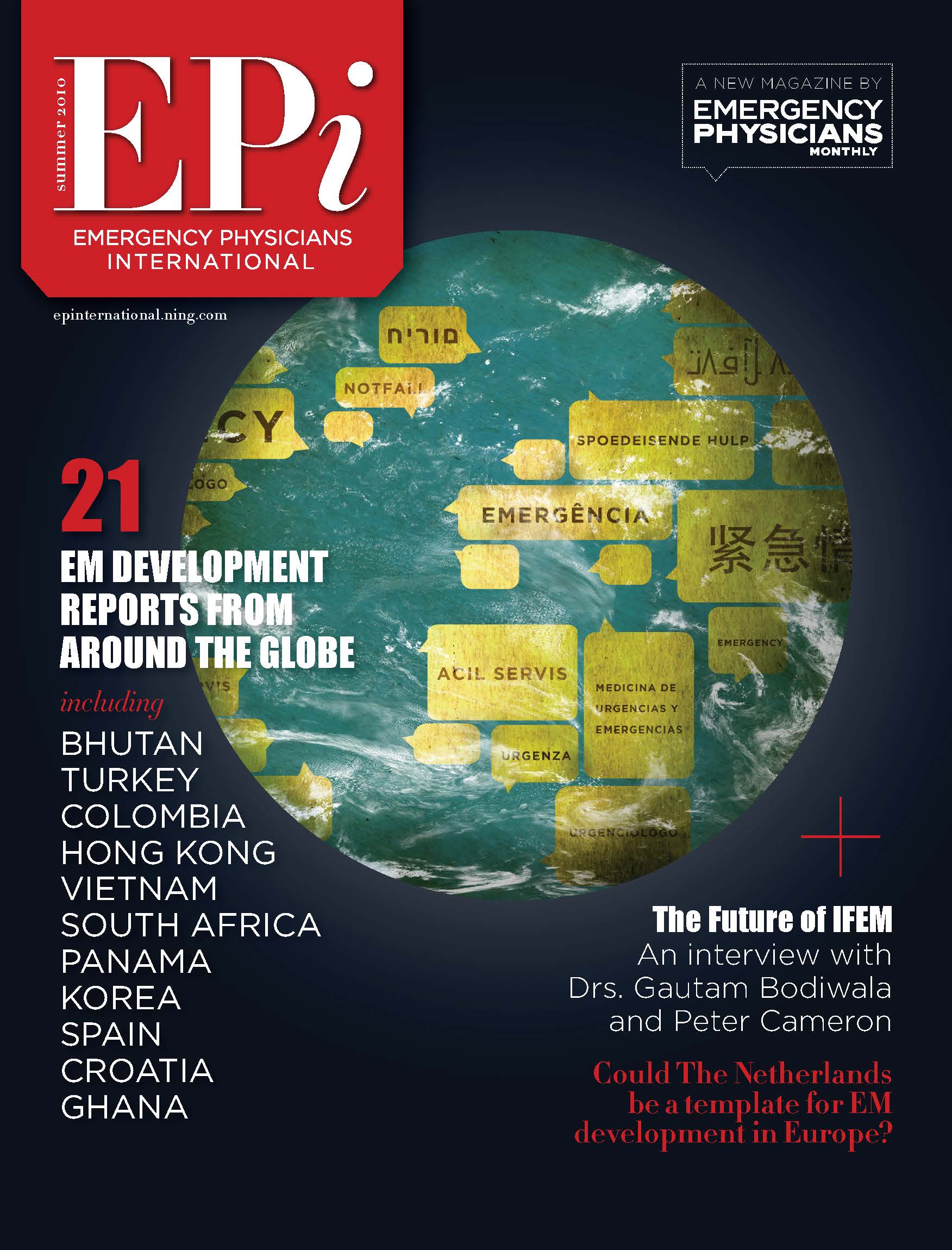Dr. Eno Biney on the Future of Emergency Medicine in West Africa
As the chairperson for the African Conference on Emergency Medicine and a pioneer in emergency medicine training in Ghana, Dr. Eno Biney has spent the last 10 years working to improve emergency care in West Africa. In this interview, Dr. Biney discusses the challenges and progress of the emergency medicine program in Ghana, including the establishment of a new residency training program at the Korle-Bu Teaching Hospital and the expansion of emergency medicine training to 13 countries in Africa. Biney also touches on the logistical challenges of running an overcrowded facility, including long wait times and burnout among staff, as well as the unique clinical challenges presented by the COVID-19 pandemic.
EPI: You have been practicing Emergency Physician for 10 years. What’s your position within the African Society or regional structure?
Dr. Eno Biney: I am the chairperson for the African Conference on Emergency Medicine.
EPI: Where did you train for emergency medicine?
Dr. Biney: I did my emergency medicine residency training in Komfo Anokye Teaching Hospital in Kumasi–Ghana under the Ghana College of physicians and surgeons as one of the pioneers.
EPI: Describe what it was like to be one of the pioneers being trained in emergency service in Ghana.
Dr. Biney: In 2009, University of Michigan collaborated with Ghana College of Physician and Surgeons, Komfo Anokye Teaching Hospital and Kwame Nkrumah University of Science and Technology to start emergency medicine residency training in Ghana; making Ghana the only training center in West Africa. It was challenging because the residency was new and one of our desires was for others to embrace what we were doing.
Previously, there were different emergency centers in the hospital: medical, surgical, ob-gyn and pediatric. At that time, patients would be tossed from one department to the other because of a lack of clarity of where the patient belonged. One of the deciding factors for me to join the residency was from observing the struggle of patients. In one case, a pregnant woman was bitten by a snake and was brought into the hospital. She bounced from ob-gyn (due to her being pregnant) and the medical unit (where she should have been the whole time). I had to sit with her at the medical unit and manage her until she was stable enough to be discharged.
EPI: How common was that type of story?
Dr. Biney: Very common before we started the emergency medicine residency. Once we started the residency it was a one stop shop. Whatever you come with, you went to the emergency- it was now one unit. We would do initial treatment and then assign them to the appropriate specialist.
EPI: You probably had to train a lot of emergency physicians. Are you producing enough physicians?
Dr. Biney: 10 years ago we had no emergency physicians. So far we have been able to train 59 emergency physicians. We currently have 17 in training with some of them graduating in December (2022).
EPI: How do you feel about where the program was 10 years ago and where it is now? Are you pessimistic or encouraged?
Dr. Biney: It is very encouraging and we are very optimistic. We’ve made a lot of progress. We’ve even started a new residency training at Korle-Bu Teaching Hospital which is the hospital of the capital of the country (Ghana). We have made a lot of progress and have expanded into other West African countries. In 2009, South Africa was the only country in Africa doing emergency medicine training and Ghana was just about starting. As of now, there are 13 countries in Africa who are doing emergency medicine. So we see that we are making a lot of progress and are excited about it.
EPI: Am I hearing that your system is positioned to be a leader on the continent, specifically in West Africa?
Dr. Biney: Yes. As pioneers, the emergency medicine faculty of the Ghana College of Physicians and Surgeons is collaborating with the West African College of Physicians and Surgeons to set up training in their college for the whole of West Africa.
EPI: What are the greatest clinical challenges that you face in emergency medicine today at your facility?
Dr. Biney: One of the greatest challenges is that it’s overcrowded. The location of our facility makes it the preferred referral hospital in the Northern sector of Ghana; so people come from all over to be treated. Being overcrowded leads to long waiting time. Some other challenges are burnout due to lack of personnel, need for equipment and funding for research.
EPI: Are there any particular clinical challenges that you are facing right now from a medical perspective?
Dr. Biney: When COVID came we were overwhelmed because the responsibility was carried by emergency physicians. We had an issue with burnout. In addition to that it was challenging to isolate patients, convince loved ones to temporarily distance themselves from those who were infected, and getting support in taking care of COVID patients. Thankfully we were able to establish protocols on how to care for patients.
EPI: Is COVID still causing disruption for you?
Dr. Biney: Because most people have been vaccinated, the spread has decreased for us. Most of our doctors were exposed and had to undergo isolation leading to an overwhelming burnout for the physicians available. At this present moment we don’t have anyone admitted for COVID.
EPI: Let’s switch gears and talk about the conference that you are the chairperson of. What did you hope to accomplish at this conference?
Dr. Biney: We hope that universal healthcare will translate into policy for us. As far as education, our training programs will be expanded to other African countries through collaboration and networking from the conference and we’ll be able to improve quality care.
EPI: Which countries would you like to see develop more robust systems in the next 5 years?
Dr. Biney: Our desire is that most of the West African countries would join us in practicing emergency medicine. This should include the francophone countries like Senegal, Mali, and Cameroon.
EPI: You said that a piece of the conference objective was policy- specifically the universal health care concept. Are you involved in policy advocacy and talking to government officials? If so, do they listen and seem interested in putting forth these ideas?
Dr. Biney: Yes, sometimes they call us for policy advice when there’s anything related to emergencies. They listen and we have seen some policies implemented. However, other policies have taken longer than we had hoped for; We’ve seen some changes but want to see more. We’re hoping to have an African Minister’s Conference so that they will participate and understand our basic needs and through that can advocate and have these put into policy.
EPI: Final thoughts on emergency medicine in Ghana?
Dr. Biney: We’re doing great work in Africa but our partners - individuals from over 40 countries have been dedicated to securing high quality medical care across Africa. We hope they all come on board and make this conference, which will be held on November 16th -18th a success. The last in person conference was four years ago. We hope that everyone comes on board to interact, share ideas, plan ahead, and move forward to ensure universal healthcare for the whole of Africa.






